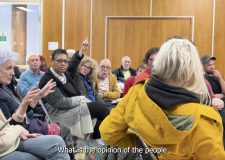Senior Brighton police officer takes up town hall post
Football fans are used to the idea of players on loan. Brighton and Hove Albion signed Steve Harper on loan from Newcastle in the autumn and Gonzalo Jara Reyes from West Bromwich Albion.
Now the idea has been taken up in a different field as the public sector tries to improve the service it provides while having to work with less money.
And the loan signing is the officer in charge of policing the first football match at Albion’s new Amex Community Stadium.
Acting Superintendent Simon Nelson has joined Brighton and Hove City Council on loan until early next year.
Until a few weeks ago the 44-year-old was the Chief Inspector in charge of operations in Brighton and Hove. He was responsible for – among other things – public order, which included the policing of big events such as football matches and protests.
Friday and Saturday night in West Street formed part of his brief, along with licensing, and he was “the police strategic lead for alcohol-related harm reduction – the police representative on the Alcohol Programme Board”.
And it was with his drinking hat on, if you’ll forgive the phrase, that he began to work more closely with his new colleagues at the council.
At about the same time, chief executive John Barradell was starting to push the idea of intelligent commissioning.
Public spending cuts were beginning to bite at the same time as the relatively new council chief and his political masters were identifying some thorny issues that the council couldn’t solve alone.
In some ways, intelligent commissioning is a new name for an old idea – joint working. The phrase joined up government also comes to mind. After all, health and social workers have been required to co-operate on certain issues, such as discharging vulnerable people from hospital and on child protection, for more than 20 years.
And organisations in Brighton and Hove have a long track record of “partnership working”. For example, when big events are planned, representatives from the council already meet with police and fire service colleagues, among others.
Mr Barradell told at recent review that intelligent commissioning was about making the biggest impact with the resources available.
It involved looking at ways of working differently with other organisations, including those in the community and voluntary sector, to “unlock value” for the city and its citizens.
The review looked at three pilot projects intended to tackle
- the impact of alcohol on the city
- drug-related deaths and
- domestic violence
These were problems, he said, that were inter-related and could not be “fixed” by one organisation alone.
At the review meeting – called by the council’s Overview and Scrutiny Commission – councillors were told about the way intelligent commissioning had started to tackle what some people perceive as Brighton’s drink problem.
Tom Scanlon, the director of public health, said that it was being addressed by the Alcohol Programme Board. It was looking at four specific issues
- the culture of alcohol use
- the availability of alcohol
- the night-time economy and
- the treatment and prevention of alcohol misuse
Availability involved the licensing team at the council and their counterparts in the police.
The night-time economy, which creates jobs and brings visitors and money to the centre of Brighton, was a matter of concern to the police as they dealt with crime and public order and safety.
Some of those enjoying the delights of Brighton’s night-time economy end up in the accident and emergency department of the Royal Sussex County Hospital. They may have had too much to drink or taken drugs or have been in a fight.
Dr Scanlon said that the four issues were linked and the Alcohol Programme Board brought strategic oversight to the issue. Its members were focused on problem solving and improving the performance of the public services that were affected by the issue.
The “intelligent” part, he said, was bringing more people together and giving them joint responsibility for a problem affecting us all.
This approach had allowed culture change to be raised, for example, through the Big Alcohol Debate.
This had been devised to bring about a better understanding of the issues around alcohol and our drinking culture.
It would lead to more early identification and explicit treatment work and therefore more positive results, he said.
The joint work had helped make clearer the funding that was available to deal with alcohol problems in the city.
Dr Scanlon said: “The Big Alcohol Debate gives us a much better understanding around alcohol use.
“I was a little bit sceptical (of intelligent commissioning) at the start. I’ve become more of a convert.
“It’s brought a lot of people together, working in a more cohesive way than in the past.”
His comments were echoed by Simon Nelson, who told the same review that when he took over the operations role as chief inspector there was an alcohol strategy but it was fragmented.
He said: “What I’m seeing now is intelligent commissioning filtering down to the operational level.”
He added that, for example, a problem with fake wine and vodka had involved trading standards and police officers working closely together. Customs officers have also been involved.
Over the past year the joint working fed into an overhaul of local licensing policy.
As a result, the relaxation of the licensing laws was being tempered by the recently extended cumulative impact zone. This made it easier to restrict new licences where drink-related problems had already been identified.
Superintendent Nelson said that formerly it had been frustrating that there was no co-ordinated strategy on alcohol.
He said: “Everybody had been doing their own bit in isolation. We wanted a plan to bring about real change.”
 There was now effective collaboration, he said. As well as working more closely with council trading standards officers, the police were also liaising more with A&E staff on alcohol-related harm.
There was now effective collaboration, he said. As well as working more closely with council trading standards officers, the police were also liaising more with A&E staff on alcohol-related harm.
The volunteers running Safe Space in St Paul’s Church in West Street, are part of this picture.
He said that over the past year 250 fewer people had been assaulted as a result of partnership measures and a comprehensive plan, adding: “Financial efficiency is important. Those 250 fewer victims of assault last year meant there were 125 investigations that we did not have to do, with 250 fewer presentations at A&E as well.”
Now Superintendent Nelson is taking the partnership working a step further, ditching his uniform and basing himself in council offices as he works more closely with the council’s regulatory and enforcement teams.
He said: “There may be perceptions about a police officer going into the local authority, about it being a takeover, which it most certainly will not be.
“There’s going to be learning both ways. In some ways my rank and standing as a police officer is irrelevant.
“This is something that’s done with local authority colleagues, not done to them. They will help identify what the opportunities are and formulate solutions and it will be them who will be critical in formulating how things are implemented while ensuring that we protect the good practice that’s already in place.”
The father of three said that there had been a big cultural change within the police over just ten years, making it much more community focused through, for example, neighbourhood policing.
“With the best of intentions,” he said, “in the past we used to tell people what we thought they needed. We would take control. We would keep people safe.
“We had the best appreciation of the more nasty things which were going on which people didn’t know about.
“There obviously have to be proper processes and structures. But if there’s a quick win, if there’s a glaring opportunity to bring about obvious benefits, we shouldn’t be a slave to any programme.
“Obviously there’s got to be broad agreement and it would need to be challenged properly. Is the local community better off? Are the teams in the local authority and the police more efficient?
“Most staff share a real determination to make a difference. Very few people just turn up to do a job. They care about the community of Brighton and Hove.
“I hope staff will feel better enabled. I hope to help people do their jobs better and bring about closer collaboration between the two organisations.
“The working partnership between Sussex Police and Brighton and Hove City Council is probably the closest I’ve experienced in 18 years.
“What more can we do to jointly improve the service that we offer to the community of Brighton and Hove working efficiently and closer together?
“This is about building on that and working in true collaboration with them.
“We used to brief each other and then we consulted. We’ve had partnership working. Now we need collaboration.
“It’s a pilot and we’ll evaluate it about a year from now. If things work we’ll try to find a sustainable way of keeping them going. If they don’t, we won’t. We’re not slaves to it.” It’s difficult to escape the feeling though that there is a real determination to make it work whether it’s called intelligent commissioning, closer collaboration or joint working.
Superintendent Nelson is aiming to make the most of this loan spell no matter what position he’s in.





















